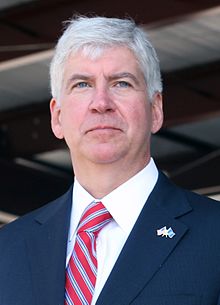
National Public Voice
Michigan Supreme Court Orders $550 Refund To Teachers
Jonathan Oosting, Detroit News Lansing Bureau
 |
| Michigan Education Association President Paula Herbart |
 |
| Rick Snyder |
Lansing — Michigan plans to refund nearly 275,000 public school employees a combined $550 million plus interest for retiree healthcare paycheck deductions deemed unconstitutional by the state Supreme Court, a ruling hailed by unions as a “major victory” for educators.
In a unanimous 6-0 decision released Wednesday, justices ordered the refunds and upheld a Court of Appeals ruling that a 2010 Michigan law violated contract clauses of the state and federal constitutions by involuntarily reducing pay for teachers and other school employees by 3 percent to fund retiree health care benefits.
Because the paycheck deductions were unconstitutional, funds collected from more than 200,000 school employees before a replacement law took effect in 2012 “must be refunded to the plaintiffs in accordance with the Court of Appeals judgment,” justices ruled.
Republican Gov. Rick Snyder’s administration is moving ahead with refunds after losing the court battle, but it’s not immediately clear how long the process will take.
The state will distribute refunds to individual school districts, which will then be tasked with repaying employees, said Kurt Weiss, a spokesman for the Michigan Office of Retirement Services. The total refund will include interest, he said, meaning the state will send roughly $554 million to districts.
“I cannot imagine a better pre-holiday gift to Michigan’s school employees than getting their hard-earned money returned to them,” Michigan Education Association President Paula Herbart said in a statement, praising the work her union and the state chapter of the American Federation of Teachers did on behalf of their members.
“This reinforces why being a member of a union matters – working collectively, we won this case that no individual could have fought for themselves,” she said.
Refunds are expected to average about $2,000 per person but will vary based on how much each school employee earned during the roughly two-year window of illegal deductions.
A person who made $50,000 a year would be in line for a $3,000 refund plus interest, according to MEA spokesman Doug Pratt. A veteran teacher will likely receive a larger refund than a bus driver or paraprofessional, he noted.
Justice Beth Clement, appointed to the bench by Republican Gov. Rick Snyder in November, did not participate in the new supreme court decision. Unions that sued the state on behalf of teachers had asked her to sit out the case because she served as Snyder’s chief legal counsel when he decided to appeal the case to the Supreme Court.
Snyder said Wednesday he was “pleased that taxpayers will have resolution” to a long-running dispute over the 2010 law signed by his predecessor, former Gov. Jennifer Granholm, a Democrat. The law was in effect from July 2010 until September 2012, when Snyder signed a replacement version upheld by the Supreme Court that year.
“The funding has been held in escrow, so Michigan will continue to have a balanced budget,” the governor said in a statement. “We will not need to raise new revenue or remove funding from other priorities to refund the money that was collected for retirement health care.”
There is no clear timeline for when refunds may be distributed. The Office of Retirement Services is working to implement the Supreme Court ruling and return contributions to the school districts where they were initially withheld from, according to Weiss.
The state will provide additional information to school districts and employees “regarding the timing and amounts for forthcoming refunds as soon as it becomes available,” Weiss said.
The MEA “will be in close contact with members” who may qualify for refunds, Pratt said, noting the state is still working out the logistics.
Wednesday’s court ruling and the pending refunds cap a nearly eight-year battle over the paycheck deduction law. One of the lead plaintiffs in the suit against the state, veteran Lansing teacher Deborah McMillin, died before the case was resolved due to complications from a knee replacement surgery. The state had deducted roughly $4,000 from her paychecks, according to the MEA.
Snyder appealed the case to the Michigan Supreme Court last year without the help of Attorney General Bill Schuette, whose office had defended the state before the Court of Appeals but declined further involvement. Instead, Snyder hired outside attorneys to represent him as special assistant attorneys general.
AFT Michigan president David Hecker said Wednesday he hopes Snyder and Schuette now work with the unions to ensure school employees get their refunds in a timely fashion.
“Michigan’s school employees have waited eight long years to get their hard-earned money returned to them – no further delay is necessary,” Hecker said in a statement.
The 2010 law was signed by Granholm amid a budget shortfall after approval by a Democratic-controlled House and Republican-dominated Senate.
A Republican-controlled Legislature amended the law in 2012 to stave off a continued legal challenge, but the teacher unions continued to fight in the courts for a refund of money deducted from employee checks over the two-year period.
The Snyder administration held $549,871,147 collected from school employees in escrow while the legal battle played out. The funds earned $4,189,341 in interest over that period, according to Weiss, who said the state will refund districts a total of $554,060,489.
Staff writer Jennifer Chambers contributed.


Be the first to comment